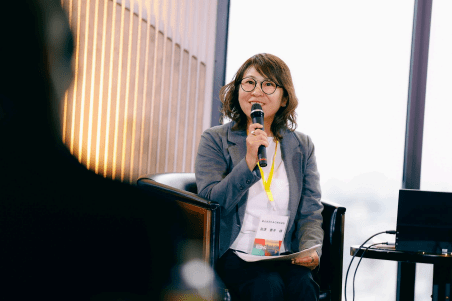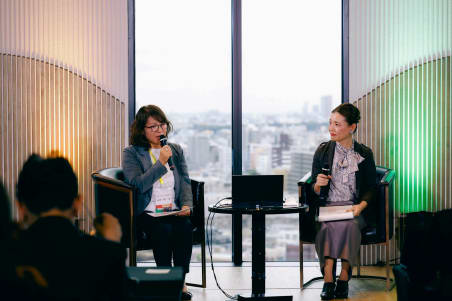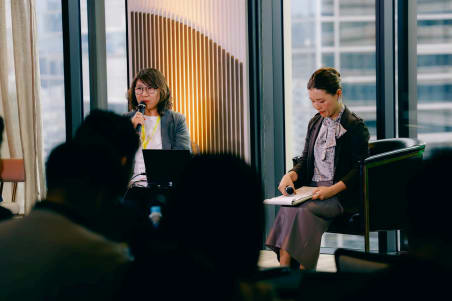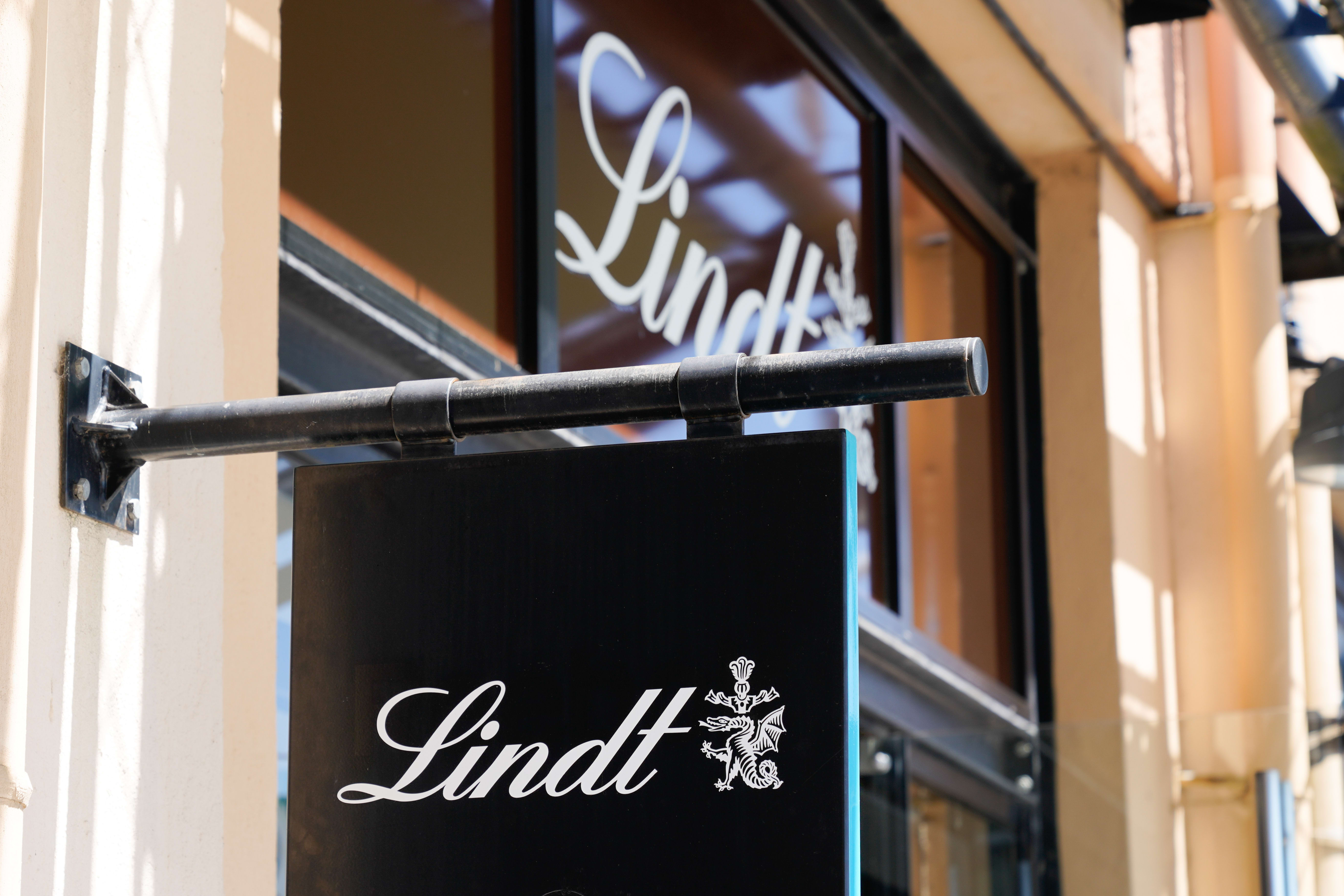
Fuji Electric Engineering & Construction (formerly Fuji Furukawa Engineering & Construction; referred to as Fuji Electric E&C from here on) was founded in 1923. It is a comprehensive facilities company covering design, construction, and maintenance across a wide range of fields. These include plant facilities, electrical equipment, building electrical construction, air conditioning, transmission, and information communication systems. The company operates not only in Japan but also across Southeast Asia, achieving over 100 billion yen in sales in fiscal year 2023 and continues to see steady growth. This article draws from a discussion that took place during EcoVadis World Tour Japan 2024, held on October 25, 2024. The conversation featured Kyoko Shimazu, Head of Sustainability Promotion at Fuji Electric E&C, and Hiroko Mohri, Rated Customer Success Associate at EcoVadis Japan. It highlights Fuji Electric E&C’s efforts to incorporate sustainability principles into its business practices. It also examines the company’s approach to overcoming challenges and advancing sustainable growth by collaborating with management.
Ramping Up Sustainable Business Practices
You joined Fuji Electric E&C in 2021. What differences or challenges have you noticed between your previous role and your current one?
Shimazu: My previous role was at a beverage manufacturer, where I was in charge of public relations and sustainability. As a company dealing with products directly tied to consumers, we were expected to address societal issues like recycling and marine plastic early on. In contrast, in the construction and facilities engineering industry where I now work, societal demands are less directly apparent compared to consumer-facing industries.
How did you initiate sustainability efforts in such circumstances?
Shimazu: Upon joining the company, I held multiple meetings with the president. He asked about our standing compared to competitors and sought an objective view of our situation. I was candid and told him that we were significantly behind.
The president himself recognized the urgency of addressing sustainability concerns, particularly for strengthening governance and recruitment. This shared understanding led to the creation of a roadmap aimed at advancing disclosure efforts within two and a half years and achieving a state where we could confidently claim to have sustainability-focused business practices by fiscal 2025. Setting this goal with the president’s agreement early on became a major driving force for our initiatives.
Using the Card Game to Deepen Management's Understanding
How did you convey this sense of urgency to the management team and encourage their understanding around sustainability?
Shimazu: To speed up efforts outlined in the roadmap, gaining the understanding of the management team was essential. First, I reported our current situation as plainly as I had to the president. Then, we conducted workshops using the 2030 SDGs card game to deepen their understanding. This exercise aligned our perspectives on the value we aim to provide.
The card game simulates the journey toward achieving the 17 SDG goals in a world of diverse values and objectives. It is widely used in corporate training. By participating, our management team re-recognized the importance of addressing societal challenges, which I believe helped foster a deeper understanding.

Changes Brought About by the EcoVadis Assessment
What prompted Fuji Electric E&C to undergo the EcoVadis assessment in 2021? How did you approach improvements after the initial assessment?
Shimazu: The decision was driven by a request from a client. When I became involved during the results of our initial assessment, we were in a situation where we did not disclose non-financial information, and we did not adequately organize data. Unsurprisingly, we received poor results. However, we shared these results company-wide and used feedback from EcoVadis to identify corrective actions. The Sustainability Promotion team worked with relevant departments to develop and implement improvement plans systematically.
By 2022, your second year of undergoing the assessment, you earned a Bronze Medal. What were the key factors in achieving this?
Shimazu: In the labor and human rights category, the development and publication of our own human rights policy played a significant role. Previously, we had adopted the policy of our parent company, Fuji Electric, as our own. However, through the EcoVadis assessment, we recognized the importance of having a policy tailored specifically to our company. This realization marked a significant step forward for us.
Additionally, we obtained external certifications such as the Eruboshi certification and the Health and Productivity Management Organization designation, which also contributed to our improved assessment score.
In the environmental category, the publication of CO2 emissions data for the first time last year was a key factor. Collaborating with various departments allowed us to re-evaluate internal practices that had been considered ‘normal’ and recognize their real value, which I believe was instrumental.
What is your perspective on the importance of external assessments?
Shimazu: Third-party assessments provide immense value for three main reasons. First, they offer an objective understanding of our position within the industry. Through the EcoVadis assessment, we gained clarity on where we stand and what goals to aim for.
Second, they highlight areas where our efforts are lacking and reveal what needs to be prioritized. Since the questions evolve annually to reflect trends, they naturally guide us toward new actions.
Third, they allow us to effectively communicate our efforts externally. Demonstrating our progress through third-party assessments in integrated reports or on our website enhances trust from investors and business partners.

Steps Toward Building Sustainability-Focused Business Practices
How will Fuji Electric E&C proceed toward establishing sustainability-focused business practices?
Shimazu: While we are still in progress, we aim to achieve the material issues set for fiscal year 2030. We will continue collaborating with internal committees and relevant departments to reach these goals. Additionally, we strive to create and maintain a virtuous cycle in our innovation process, continually challenging ourselves to maximize the value we deliver.
Achieving this requires not only team efforts but also the voluntary actions of each employee. The Sustainability Promotion team intends to provide more guidance and resources to support these initiatives. At the same time, we are shifting the leadership of internal dissemination activities from the Sustainability Promotion team to individual divisions, encouraging them to take ownership.
Lastly, what message would you like to share with women pursuing careers in sustainability, especially in a male-dominated industry?
Shimazu: Whether in sustainability or beyond, the growth of companies and society requires diverse perspectives and flexible thinking. Although women remain a minority in industries like facilities engineering, I believe ideas born from individual experiences and perspectives can drive meaningful innovation. While this field can sometimes feel intangible, I encourage women to believe in their abilities and continue to take on new challenges.
About the Author
Follow on Twitter Follow on Linkedin Visit Website More Content by EcoVadis EN























